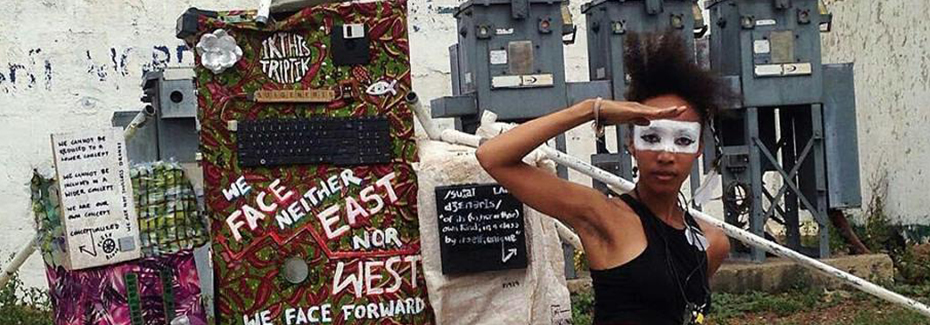The Center for African Studies was pleased to host Fall 2018 Visiting Artist Elisabeth Efua Sutherland. Sutherland is an artist, dancer, choreographer, playwright, and director, based in the West African nation of Ghana. Sutherland holds a B.A. in Theatre from DePauw University (USA) and an MA in Performance Arts from Brunel University (UK). Sutherland is co-founder of Ghana’s Accra Theatre Workshop, which supports youth artists through free workshops and events throughout the year, focusing on contemporary, experimental theatre and performance. The Accra Theatre Workshop can be explored online through their website, Facebook page, Twitter, or Instagram. While at UF, Sutherland conducted workshops and performances through the dance program, met with curators at the Harn Museum and the libraries, and talked to faculty in theatre, architecture, and African Studies programs. She lectured at the CAS Baraza and performed “Black Noise” at the Harn Museum.
Baraza
On Friday November 3, Sutherland presented “Deverb: Echo Chambers and Common Things Made Holy” at Baraza. This lecture was based on a work in progress, touching on commodity fetishism, social media, and society. She framed the lecture as an “exploratory literature review,” working towards connecting the online social experiences of Ghanaians to what is being practiced in society. She hopes to use these discussions to understand how traditional performances such as Nyonkro can be influenced by contemporary culture. Sutherland began the lecture by considering the idea of the social media “filter bubble.” This refers to the process in which internet users are encouraged to personalize their web presence, thereby informing algorithms that then provide users with tailored content. As content becomes more personalized, internet users become more entrenched in their “filter bubble,” limiting exposure to things, people, or ideas that they do not agree with.
These “filter bubbles” reinforce the idea of the “echo chamber,” where information and ideas are repeated and enforced, echoed back to the people who agree with the content. People with differing ideas are “unfollowed” and soon internet users have curated a social media presence that mirrors back the opinions held by the user. Sutherland makes the point that blocking or unfollowing people outside of your communities does not make them go away. Instead, responses like these gradually lead to segregation on social media. Sutherland notes that groups become exclusive and attack intruders, but how are these online behaviors different from behaviors expressed in physical space? These acts of exclusion push internet users further into echo chambers where only their opinions are being reinforced. Sutherland wants to continue down this line of thinking to link concepts of social media use back to traditional performances. Performances such as Nyonkro are highly improvisational but have a performance structure. Sutherland believes that freedom and control of narratives not allowed on the internet break down echo chambers and weaken the rigidity of dualities. She hopes to explore these connections in future work.
Dance Performance
Sutherland performed “Black Noise,” on Sunday November 5 at the Harn Museum of Art. Using sound, movement, and simple interactivity, Sutherland explored black as a lament, a color, a meditation. Viewers of her performance lined the walls of the gallery space at the Harn, following her on foot as she moved about the room. Her performance incorporated components of contemporary, modern, and traditional dance, with spoken word in Twi and English throughout.
Sutherland’s work includes:
- Artist, choreographer, and playwright: “Anansi’s Wife/Akua’s Daughter,” “Sui Generis,” and “Dreamscape”
- Director and co-writer: “An African walks into an Echo Chamber,” and “The Cholera Diaries”
- Choreographer: “Too Naughty” by Ghanaian artist Worlasi
- Director: “An African Walks into a Voting Booth, ”“Summer Shakespeare,” “Stereo Love by Emmanuel Deegbe,” and “Ake: The Years of Childhood by Wole Soyinka”
- Choreographer and art director: “Waves/The Water” by London-based Ghanaian artist SUTRA
This visit was made possible by the Center for African Studies, School of Theater and Dance, and the Harn Art Museum.
